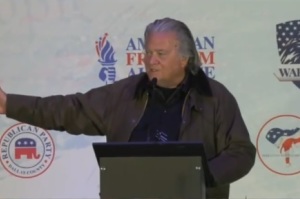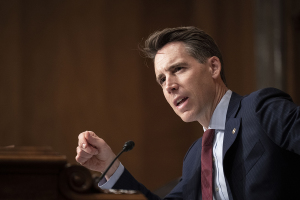State of the Union 2013 Transcript: President Obama's Full Speech Text
Already, we have brought home 33,000 of our brave servicemen and women. This spring, our forces will move into a support role, while Afghan security forces take the lead. Tonight, I can announce that over the next year, another 34,000 American troops will come home from Afghanistan. This drawdown will continue. And by the end of next year, our war in Afghanistan will be over.
Beyond 2014, America's commitment to a unified and sovereign Afghanistan will endure, but the nature of our commitment will change. We are negotiating an agreement with the Afghan government that focuses on two missions: training and equipping Afghan forces so that the country does not again slip into chaos, and counter-terrorism efforts that allow us to pursue the remnants of al Qaeda and their affiliates.
Today, the organization that attacked us on 9/11 is a shadow of its former self. Different al Qaeda affiliates and extremist groups have emerged – from the Arabian Peninsula to Africa. The threat these groups pose is evolving. But to meet this threat, we don't need to send tens of thousands of our sons and daughters abroad, or occupy other nations. Instead, we will need to help countries like Yemen, Libya, and Somalia provide for their own security, and help allies who take the fight to terrorists, as we have in Mali. And, where necessary, through a range of capabilities, we will continue to take direct action against those terrorists who pose the gravest threat to Americans.
As we do, we must enlist our values in the fight. That is why my Administration has worked tirelessly to forge a durable legal and policy framework to guide our counterterrorism operations. Throughout, we have kept Congress fully informed of our efforts. I recognize that in our democracy, no one should just take my word that we're doing things the right way. So, in the months ahead, I will continue to engage with Congress to ensure not only that our targeting, detention, and prosecution of terrorists remains consistent with our laws and system of checks and balances, but that our efforts are even more transparent to the American people and to the world.
Of course, our challenges don't end with al Qaeda. America will continue to lead the effort to prevent the spread of the world's most dangerous weapons. The regime in North Korea must know that they will only achieve security and prosperity by meeting their international obligations. Provocations of the sort we saw last night will only isolate them further, as we stand by our allies, strengthen our own missile defense, and lead the world in taking firm action in response to these threats.
Likewise, the leaders of Iran must recognize that now is the time for a diplomatic solution, because a coalition stands united in demanding that they meet their obligations, and we will do what is necessary to prevent them from getting a nuclear weapon. At the same time, we will engage Russia to seek further reductions in our nuclear arsenals, and continue leading the global effort to secure nuclear materials that could fall into the wrong hands – because our ability to influence others depends on our willingness to lead.
America must also face the rapidly growing threat from cyber-attacks. We know hackers steal people's identities and infiltrate private e-mail. We know foreign countries and companies swipe our corporate secrets. Now our enemies are also seeking the ability to sabotage our power grid, our financial institutions, and our air traffic control systems.
We cannot look back years from now and wonder why we did nothing in the face of real threats to our security and our economy.
That's why, earlier today, I signed a new executive order that will strengthen our cyber defenses by increasing information sharing, and developing standards to protect our national security, our jobs, and our privacy. Now, Congress must act as well, by passing legislation to give our government a greater capacity to secure our networks and deter attacks.
Even as we protect our people, we should remember that today's world presents not only dangers, but opportunities. To boost American exports, support American jobs, and level the playing field in the growing markets of Asia, we intend to complete negotiations on a Trans-Pacific Partnership. And tonight, I am announcing that we will launch talks on a comprehensive Transatlantic Trade and Investment Partnership with the European Union – because trade that is free and fair across the Atlantic supports millions of good-paying American jobs.
We also know that progress in the most impoverished parts of our world enriches us all. In many places, people live on little more than a dollar a day. So the United States will join with our allies to eradicate such extreme poverty in the next two decades: by connecting more people to the global economy and empowering women; by giving our young and brightest minds new opportunities to serve and helping communities to feed, power, and educate themselves; by saving the world's children from preventable deaths; and by realizing the promise of an AIDS-free generation.
Above all, America must remain a beacon to all who seek freedom during this period of historic change. I saw the power of hope last year in Rangoon – when Aung San Suu Kyi welcomed an American President into the home where she had been imprisoned for years; when thousands of Burmese lined the streets, waving American flags, including a man who said, "There is justice and law in the United States. I want our country to be like that."
In defense of freedom, we will remain the anchor of strong alliances from the Americas to Africa; from Europe to Asia. In the Middle East, we will stand with citizens as they demand their universal rights, and support stable transitions to democracy. The process will be messy, and we cannot presume to dictate the course of change in countries like Egypt; but we can – and will – insist on respect for the fundamental rights of all people.
We will keep the pressure on a Syrian regime that has murdered its own people, and support opposition leaders that respect the rights of every Syrian. And we will stand steadfast with Israel in pursuit of security and a lasting peace. These are the messages I will deliver when I travel to the Middle East next month.
All this work depends on the courage and sacrifice of those who serve in dangerous places at great personal risk – our diplomats, our intelligence officers, and the men and women of the United States Armed Forces. As long as I'm Commander-in-Chief, we will do whatever we must to protect those who serve their country abroad, and we will maintain the best military in the world. We will invest in new capabilities, even as we reduce waste and wartime spending. We will ensure equal treatment for all service members, and equal benefits for their families – gay and straight. We will draw upon the courage and skills of our sisters and daughters, because women have proven under fire that they are ready for combat. We will keep faith with our veterans – investing in world-class care, including mental health care, for our wounded warriors; supporting our military families; and giving our veterans the benefits, education, and job opportunities they have earned. And I want to thank my wife Michelle and Dr. Jill Biden for their continued dedication to serving our military families as well as they serve us.
But defending our freedom is not the job of our military alone. We must all do our part to make sure our God-given rights are protected here at home. That includes our most fundamental right as citizens: the right to vote. When any Americans – no matter where they live or what their party – are denied that right simply because they can't wait for five, six, seven hours just to cast their ballot, we are betraying our ideals. That's why, tonight, I'm announcing a non-partisan commission to improve the voting experience in America. And I'm asking two long-time experts in the field, who've recently served as the top attorneys for my campaign and for Governor Romney's campaign, to lead it. We can fix this, and we will. The American people demand it. And so does our democracy.
Of course, what I've said tonight matters little if we don't come together to protect our most precious resource – our children.
It has been two months since Newtown. I know this is not the first time this country has debated how to reduce gun violence. But this time is different. Overwhelming majorities of Americans – Americans who believe in the 2nd Amendment – have come together around commonsense reform – like background checks that will make it harder for criminals to get their hands on a gun. Senators of both parties are working together on tough new laws to prevent anyone from buying guns for resale to criminals. Police chiefs are asking our help to get weapons of war and massive ammunition magazines off our streets, because they are tired of being outgunned.



























